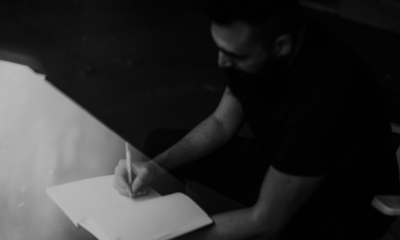Life
What Happens to Your Life When You Stop Blocking Pain

“Monsters are real, and ghosts are real too. They live inside us, and sometimes, they win.” Thank you, Mr. Stephen King. We know that. We all have to struggle with those monsters from time to time. Doing that, I got one and the same piece of advice from my family and friends: forget and let it go.
What? To forget those black holes of pain and despair swallowing the palladium of happiness and destroying the last vestiges of joy in my life? To forget those black holes growing bigger regardless of my painful attempts to let them go?
They must be joking. When it seemed a no-win situation, people sincerely tried to help me. “Everything is gonna be okay,” they said. “Take a break and have some rest,” they said. And I did what they said. More than that, it worked! For a day or week.
I tried to avoid being alone, I met with friends, I worked far into the night, I read, I listened to music, I wrote articles on generating ideas to boost motivation and productivity. And I didn’t allow myself to think about my inner pain and despair.
But sooner or later the moment came when even happy-ending movies could make me cry and lie on the path to destruction again. This teeterboard had been taking place for years until I decided to sink to the bottom of that darkness and emptiness.
The problem is, we aren’t able to suffer today
In our fast-moving world, we have no time and skills to do that. The traditions of fighting depression come down to one simple phrase: “You need to move on.”
We can’t experience grief and feel sad. Breaking up with loved ones, facing death, or losing a job, we all do the same: we move on and keep on living, ignoring the damage all those losses cause to our minds. We block the problem. Instead, we would rather stop and get rid of the pain source. Instead, we would rather get into a shell and live the pain slowly.
The first time I met this problem was when I had lost my best friend. I remember everyone trying to support me: they went to college with me, they took me to cafes, and they discussed numerous topics with me. Except for the most painful one.
And when I voiced her name (she was the only topic I wanted to discuss), everyone suddenly froze in awkward silence. They didn’t know how to comfort a friend in crisis. In order not to mar conversations and discomfort others, I had to switch topics.
That was the lesson learned. It’s embarrassing and awkward to discuss your problems, and it’s improper to suffer and feel pain. Moreover, it’s dreadful. Pain always equaled something negative, frightful, and all-absorbing. If there were mechanisms that allowed avoiding pain, I grasped for any change to use them. And that was my biggest mistake.
“It’s okay if you fall down and lose your spark. Just make sure that when you get back up, you rise as the whole damn fire.” – Colette Werden
Pain and fear don’t disappear
The more we try to ignore and forget them, the stronger they become and come back again. More than that, they make us emotional cripples. Not allowing ourselves to feel inner pain, we let it stay inside and settle down there forever. Then, it becomes the source of different insecurities, neurotic disorders, and phobic reactions determining our deeds and behavior in future.
That pain and fear will overstrain our nerves and plague others’ life out. Come face to face with your pain. Blocking it will not let you know the enemy by sight. There is a psychotherapeutic methodology called a method of paradoxical intention when clients are asked to meet their fears. Once they stopped struggling with the problem and allowed it to EXIST, the symptoms weakened.
Live your pain.It’s significant for pain to materialize, scar, and, eventually, leave us wiser. Facing pain and fears, we get the chance to bear real us, allowing ourselves to be weaker than public attitudes define.
Once we face pain and fears, they will fall from power
Accept it. Accepting your fears, you’ll be able to manage them. You’ll leave them no ways to win, making them your weapon. Just admit that it’s painful, frightful, and bitter.
Admit there was a reason for your pain. As a rule, we feel this reason deep inside our gut. If you don’t, keep on looking everywhere until you have a hunch somewhere in a traffic jam, a shower, or wherever. And then it’s time to come out of your shell.
Name the reason aloud or write it down. Ask yourself why it’s so hard to think and talk about it. Examine its every split and corner. And give it a chance to feel ill a bit. It’s like a vaccine: you’ll be hardened to a virus only after you get a dose of it.
“Everything will be okay in the end. If it’s not okay, it’s not the end.” – John Lennon
Make it a friend
Your inner pain is not your enemy but old friend signaling about the danger. You can’t make all your problems disappear forever. Still, coming to terms with them and accepting your inner monsters, you get powers to control them and beat the stuffing out of them.
You know who you are. You know your chink in the armor. You know you can love and fight despite all defeats. And this knowledge makes you wiser.
Accept your pain as if it’s your old friend who comes to warn you about dangers. Feel it, diving into its deepest bottoms to push off, discover yourself, and continue swimming at your ease.
How have you used pain to excel to a better life? Please leave your thoughts below!
Image courtesy of Twenty20.com
Life
Why Moving to a New City Can Change Your Mindset
Discover how moving to a new city boosts neuroplasticity, builds resilience, and reshapes your mindset

Relocation is always a challenge. Rebuilding and restarting your life requires you to step outside of your comfort zone. (more…)
Change Your Mindset
The Hidden Reason You Can’t Stay Consistent
If motivation keeps failing you, the real issue isn’t discipline. It’s the identity shaping your habits and long-term success.

Success often looks like a time-management problem. You buy a planner, set reminders, and hope that next week will be different. For a few days, it works. Then stress hits, motivation drops, and old patterns return. (more…)
Did You Know
How Skilled Migrants Are Building Successful Careers After Moving Countries
Behind every successful skilled migrant career is a mix of resilience, strategy, and navigating systems built for locals.

Moving to a new country for work is exciting, but it can also be unnerving. Skilled migrants leave behind familiar systems, networks, and support to pursue better job opportunities and a better future for their families. (more…)
-

 Business4 weeks ago
Business4 weeks agoWhy Entrepreneurs Should Care About AI Automation Testing
-

 Business4 weeks ago
Business4 weeks agoWhy Smart FMCG Entrepreneurs Outsource What They Can’t Automate
-

 Business3 weeks ago
Business3 weeks agoWhat Every Business Owner Should Know Before Investing in API Integration
-

 Did You Know4 weeks ago
Did You Know4 weeks agoThe SEO Traps Even Experienced Marketers Fall Into
-

 Business4 weeks ago
Business4 weeks agoWhy Smart Entrepreneurs Are Quietly Buying Gold and Silver
-

 Business2 weeks ago
Business2 weeks agoHow Smart Brands Use Instagram Data to Outperform Competitors
-

 Business3 weeks ago
Business3 weeks agoThe Paradox of Modern Work: Can Tech Make Us More Human?
-

 Business2 weeks ago
Business2 weeks agoHow AI Agents Can Quietly Expose Your Business to Serious Risk






























1 Comment